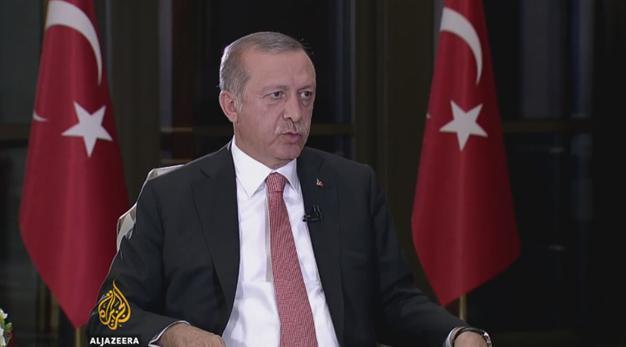Erdoğan says he learned of coup attempt from his brother-in-law
ANKARA

Turkish President Recep Tayyip Erdoğan said late on July 20 that he learned about the failed coup attempt on July 15 from his brother-in-law, not the intelligence services.
“It was my brother-in-law who first gave me the news. Initially my reaction was disbelief,” Erdoğan told Al Jazeera in an interview.
“I then had a conversation with [Hakan Fidan,] the head of the National Intelligence Agency [MİT], I was already with the Energy Minister [Berat Albayrak] on site and we decided to take a number of steps. One of the first steps involved my family and me taking a helicopter from where we were to Dalaman, and from Dalaman to come to Istanbul by plane,” he added.
The president also said foreign countries might have been involved in the coup attempt, declining to name any.
“There might be other countries involved as well. The Gülenist terror organization has another ‘superior mind’ [üst akıl], and a time will come when those connections will be revealed. We have to be patient ... But I don’t think it will take long. The judiciary is acting and I think all of those connections will come to light,” Erdoğan said.
Commenting on the recent debate on the reinstallation of death penalty in the country, he also said he would approve it if it is approved by parliament.
“If parliament makes that decision, then the duty of the authorities in power is to pave the way for this punishment to be reintroduced. The people have voiced this demand. They have taken to the streets and chanted ‘capital punishment, capital punishment, capital punishment,’” Erdoğan said.
However, he added the decision on capital punishment should not affect the country’s relations with the EU.
Erdoğan also told French Foreign Minister Jean-Marc Ayrault “to mind his own business” after he warned Ankara over the crackdown after the failed coup attempt.
“He should mind his own business. Does he have the authority to make these declarations about my person? No he does not. If he wants a lesson in democracy he can very easily get a lesson in democracy from us,” he said.
Meanwhile, serious intelligence deficiencies were also admitted by Deputy Prime Minister Numan Kurtulmuş during a meeting with representatives of media outlets on July 21.
“It’s unfortunately clear that there were some very serious deficiencies with regard to intelligence,” Kurtulmuş said, adding these deficiencies could emanate from individual, institutional and structural problems. When reminded that the information there had been military mobility in Ankara and Istanbul was shared with the president and prime minister hours after intelligence and military officials discussed the developments, Kurtulmuş admitted “there were serious gaps” in the chain of information.
“It’s obvious that there are individual or institutional weaknesses. It may also be structural. It’s obliged that all these [intelligence and of military decision-making] processes should be under civilian control. The civilian part of the state should be strengthened,” Kurtulmuş said.
The deputy prime minister also underlined that the structure of the MİT and civil-military relations mechanisms could also be reviewed in order to discourage those who might consider staging a coup in the future.
The timing of when Erdoğan and other government figures were informed of the coup attempt has sparked debate, with the MİT saying that it informed the top brass in the afternoon.
 Turkish President Recep Tayyip Erdoğan said late on July 20 that he learned about the failed coup attempt on July 15 from his brother-in-law, not the intelligence services.
Turkish President Recep Tayyip Erdoğan said late on July 20 that he learned about the failed coup attempt on July 15 from his brother-in-law, not the intelligence services.